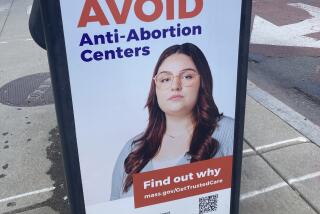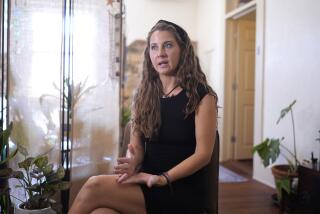California Journal: Going undercover at crisis pregnancy centers
You’ve seen the billboards up and down the state: “Pregnant and scared?”
Well, Dania Flores wasn’t pregnant but she was a little bit scared the first time she visited a crisis pregnancy center. A recent high school graduate, she was working undercover, posing as a pregnant teen to gather intel on these operations, which have but one goal: to prevent abortion.
Last year, Flores visited 43 crisis pregnancy centers around California, many in impoverished parts of the Central Valley. She was recruited by NARAL Pro-Choice California to help bolster political support for a law that would force crisis pregnancy centers to inform women that they might be entitled to state-funded support for all reproductive health services, including prenatal care and abortion.
In an interview Monday at NARAL’s office here, Flores told me she did not record her visits, which would have violated California law, but recorded herself immediately after most visits, sometimes in the car, while the details were still fresh.
Similar investigations have been conducted around the country. Vice Media also went undercover. In April, Cosmopolitan published an account of a crisis pregnancy center conference where the work was described as a ministry.
In all her visits to CPCs, Flores said she was never informed that abortion was a safe, legal alternative to childbirth. She was never told that California’s Medi-Cal program covered the cost of reproductive services, including abortion. Nor that time was of the essence.
Instead, she says, she was misled and shamed by anti-abortion activists masquerading as concerned healthcare providers.
In Burbank, she was asked to watch a video of an actual abortion. In Hollywood and Lodi, staffers shared with her the guilt they felt after their own abortions.
In Mountain View, she agreed to a free vaginal ultrasound after a regular ultrasound did not detect a fetus — because, of course, there wasn’t one. After inserting the wand, the sonogram technician mistook Flores’ IUD for a fetus, and informed her it did not have a heartbeat.
Every clinic spouted the lie that abortions cause breast cancer. “You’re 16 and they’re telling you you’re going to get breast cancer,” Flores said. “You don’t want to get breast cancer, so you don’t do it.”
Birth control was discouraged. Pills, she was told, cause headaches and “put hormones in your body you don’t need.” Condoms “have a bunch of little holes you might not know about.”
“A lot of what they said to Dania is outrageous,” said Rebecca Griffin of NARAL Pro-Choice California. “But it’s all corroborated with their print materials.”
::
Some of California’s 160 pregnancy crisis centers are licensed medical clinics; many are not. Most are funded privately, though some receive federal funds earmarked for abstinence programs.
When a woman calls to ask about abortion, she is urged to make an appointment. Some centers are upfront about not offering abortions, but women are invited in anyway, for free pregnancy tests or free ultrasounds.
Abortion-rights supporters have figured out how to counteract CPCs in ways that don’t compromise free speech and religious freedom. In 2011, for instance, San Francisco passed a law requiring CPCs to be truthful about the limited services they provide. In February, a federal judge upheld the law. “False and misleading” commercial speech, she ruled, is not protected by the 1st Amendment.
On Tuesday, the state Assembly Judiciary Committee approved the Reproductive Fact Act, which would require crisis pregnancy centers to inform patients that California has public programs providing free or low-cost access to comprehensive family planning.
“Our state has a compelling interest to make sure all pregnant women have timely access to healthcare … whether prenatal care or an abortion,” said the bill’s co-author, Assemblyman David Chiu (D-San Francisco). “Our bill does not require referrals to abortion clinics, does not provide a preference over one kind of clinic or another, and it doesn’t discriminate on the basis of viewpoint or religion.”
Sheldon Hadley, an attorney who chairs the boards of two licensed crisis pregnancy centers in Marysville, defended their work. He told the committee that his clinics often help women sign up for services like Medi-Cal and food stamps. But, he acknowledged in an interview, staffers do try to talk women out of abortion.
“We believe that abortion is not a good thing for the woman, and obviously we don’t think it’s a good thing for the baby.”
There is no doubt the proposed bill would undermine the crisis pregnancy centers’ mission.
That did not sit well with a couple of the Judiciary Committee’s conservative members, who said the law would force CPC staffers to violate their conscience by telling pregnant women the state pays for abortions.
“Why is abortion so important to you people?” asked Irvine Republican Donald Wagner. “You stand up and tell us something that is patently untrue, that there are people in California in 2015 that don’t know abortion is available? What is it about that procedure that is so important to you?”
Autumn Burke, a Democrat from Los Angeles and the bill’s co-author, responded: “Because it’s my constitutional right. It’s the law.” (Burke, who is black, chided Wagner for the phrase “you people.” He said he meant Democrats.)
Yuba City Republican James Gallagher raised questions about the legitimacy of the NARAL report and defended the care provided by CPCs. “They spend hours counseling and talking women through this decision because they care,” he said. “The biggest thing that these places provide is hope.”
No, the biggest thing they provide is misinformation.
“Hope,” anyway, is hardly the same as competent, ethical medical care.
Especially if you’re pregnant and scared.
Twitter: @AbcarianLAT
More to Read
Sign up for Essential California
The most important California stories and recommendations in your inbox every morning.
You may occasionally receive promotional content from the Los Angeles Times.











